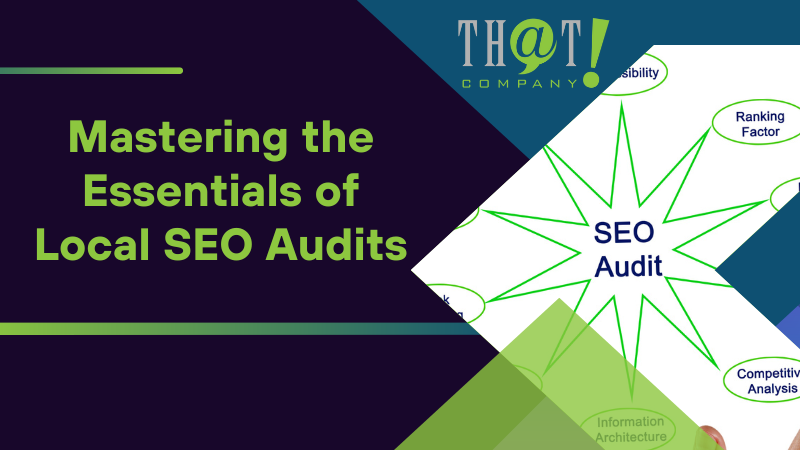
Are you struggling to appear in local search results? A local SEO audit is your first step toward visibility. In this no-fluff guide, we break down each stage of the audit process, explain what to look for, and equip you with actionable steps to enhance your local SEO strategy and drive more customers to your doorstep.
Key Takeaways
- A local SEO audit is crucial for enhancing a business’s visibility in local search results. It entailed systematic scrutiny of your website’s online presence, pinpointing problems, and discovering opportunities to improve rankings and attract local customers.
- The audit process should include a comprehensive checklist focused on Google Business Profile optimization, scrutinizing local citations and listings, identifying and integrating local keywords, and strengthening on-page elements and off-page SEO through quality backlinks and community engagement.
- Utilizing analytics is essential for gaining local insights, tracking performance, and developing tactical plans post-audit, which involves prioritizing tasks, regularly measuring progress, and adjusting strategies to improve and sustain local SEO success.

Mastering the Essentials of Local SEO Audits
Let’s start by demystifying what a local SEO audit is. Essentially, it’s a health check for your business’s online presence. It involves examining various elements that contribute to your visibility in local search results. This systematic approach helps you understand how your website is performing, pinpoint problems, and discover opportunities to dominate local search results. To get started on improving your online presence, consider taking advantage of a free local SEO audit, utilizing local SEO audit tools, and exploring local SEO services for additional support.
Why is this important? Think about the last time you looked for a service near you or tried to find the nearest coffee shop. Chances are you turned to a search engine, and your customers are no different. Therefore, conducting a thorough local SEO audit is key to ensuring that your business stands out in the local search landscape.
Understanding Local SEO and Its Impact on Your Business
Before we delve into the nitty-gritty of conducting a local SEO audit, let’s briefly touch on the importance of local SEO. By optimizing for local SEO, you are essentially enhancing your business’s online visibility. This makes your business more discoverable to local customers who are searching online, significantly increasing foot traffic to your physical locations.
Additionally, reviews play a significant role in influencing new customer acquisition by establishing credibility and trust. Essentially, local SEO is your ticket to becoming the go-to local business in your locality.
The Local SEO Company That Other Local SEO Companies Use
Now, you might be wondering, “Who can I turn to for expert guidance in this complex field of local SEO?” Enter That! Company, recognized as “The Local SEO Company That Other Local SEO Companies Use.” It’s not just a catchy phrase; it underscores That! Company’s unique value proposition and trusted reputation in the industry.
They provide comprehensive white label SEO services, allowing other agencies to tap into their local SEO expertise.

Crafting Your Local SEO Audit Checklist
So, now that we’ve established the importance of local SEO and identified an industry leader, let’s dive into the process of conducting a local SEO audit. Start by creating a structured document or spreadsheet – your local SEO audit checklist. This checklist should include categories such as:
- Google Penalties
- Local keyword research
- Rankings
- Links
- Citations
- Brand mentions
- Google Business Profile
- Reviews
- Ratings
- Social media
This systematic approach allows you to identify specific areas of concern and make targeted, efficient improvements.
Remember, your audit is a health check; it’s about diagnosing issues and prescribing solutions, not hastily jumping into impulsive actions.
Google Business Profile Optimization
One key area to focus on in your local SEO audit is the optimization of your Google Business Profile. Ensuring that your profile is comprehensive and accurate can significantly impact your visibility within Google Maps and organic search results. Pay special attention to the accuracy and completeness of your profile’s various components. This is essential for businesses aiming to feature prominently in local search results and attract potential customers.
Enhancing your Google Business Profile can lead to higher rankings in search results and an increase in conversion rates.
Scrutinizing Local Citations and Listings
Another important aspect of your local SEO audit is scrutinizing your local citations and listings. Consistency is key here – maintaining consistent Name, Address, and Phone Number (NAP) details across all your listings is crucial to prevent damage to your credibility and avoid lower search engine rankings. Therefore, conducting a business name search to locate your current listings and verify data on top citation sites is a must.
Additionally, assessing online mentions in local directories and resolving any duplicate or outdated local business listings can consolidate search engine confidence in the accuracy of your business information, making your presence more prominent in local listings.

Delving into Local Keyword Mastery
Now that we’ve tackled the basics of the audit checklist, let’s delve into the realm of local keyword mastery. To conduct local keyword research effectively, it is crucial to target relevant terms, ensure visibility for appropriate local searches, and align with user search intent for better engagement. Tools like Google Keyword Planner and Semrush’s Position Tracking can be used to identify and prioritize relevant keywords.
Keep in mind that effective strategies for integrating local keywords include incorporating them into URLs, headings, title tags, meta descriptions, and anchor text across multiple web pages.
Pinpointing High-Value Local Keywords
Understanding local keywords is great, but how do you pinpoint high-value local target keywords? Start by focusing on industry-related keywords that are most relevant to your business – these are the ones that will attract qualified leads. Enhance these keywords with modifiers like ‘best,’ ‘top,’ or location-specific terms to improve their effectiveness in attracting targeted local traffic. Don’t forget about long-tail keywords, which can attract highly-targeted audiences and potentially improve rankings for niche topics.
Some tips for pinpointing high-value local keywords include:
- Focus on industry-related keywords that are most relevant to your business
- Enhance keywords with modifiers like ‘best,’ ‘top,’ or location-specific terms
- Consider long-tail keywords to attract highly targeted audiences and improve rankings for niche topics.
Additionally, tools like Google Analytics can help you identify local keywords that drive significant traffic and conversions.
Aligning Content with Local Search Queries
Once you have your high-value keywords, it’s time to align your content with local search queries. This involves customizing your content with information that resonates with the local community and incorporating specific geographic areas that your business serves.
Identifying content opportunities for each stage of a customer’s journey, including informational, transactional, navigational, and commercial aspects, can enhance the alignment of your web content with local search terms. Remember, engaging content is not just about keywords – it’s about creating a connection with your local audience.

Enhancing Visibility Through On-Page Factors
Now that we’ve covered keywords and content, let’s shift our focus to another critical aspect of local SEO: on-page factors. These include elements like meta descriptions, page titles, and headings that serve as primary descriptors for search engine crawlers. Additionally, structured schema markup can enhance your chances of being featured in Google’s featured snippets, increasing local search visibility.
Optimizing these on-page factors ensures your web pages are structured and relevant to local search keywords, enhancing user satisfaction and search rankings.
Page-Level Local SEO Tactics
Diving deeper into on-page factors, let’s explore some page-level local SEO tactics. One such tactic is implementing schema markup, a strategic practice for optimizing web pages to enhance how search engines interpret and display them in local searches.
Some benefits of implementing schema markup include:
- Increased likelihood of obtaining rich snippets in search results
- More visibility in search results
- Higher click-through rates from potential local customers.
By providing clear context and details, schema markup aids in ranking for location-based queries and improves the overall search experience for users seeking local information.
Address Duplicate Content Issues
Another crucial aspect of on-page SEO is addressing duplicate content issues. Duplicate content can harm your search engine rankings and impact the quality and authority of your content. Therefore, it’s imperative to identify and address any broken internal links during your local SEO audit.
Most site auditing tools will flag content that requires or has malformed canonical tags, which are essential for prioritizing original content in Google rankings.

Strengthening Off-Page SEO Elements
With on-page factors in check, let’s turn our attention to strengthening off-page SEO elements. A key aspect of off-page SEO is the quality and quantity of backlinks your website has. A robust backlink profile can help your website gain prominence in local search results, and a backlink profile comparison with competitors can help you identify any gaps that could affect your ability to outrank them.
Building a Robust Backlink Profile
Backlinks are essentially votes of confidence from other websites, indicating that your content is valuable and trustworthy. Therefore, building a robust backlink profile is paramount. Backlinks from established local .org and .edu sites are highly valuable, passing more link equity compared to newer websites and significantly contributing to the improvement of your website’s local SEO.
Local backlinks can be effectively acquired through targeted methods such as creating local content, engaging in local community events, and leveraging insights from Google Analytics.
Engaging with Local Online Communities
Besides backlinks, engaging with local online communities is another effective off-page SEO tactic. Active participation in local forums and contributions to local blogs can lead to backlink opportunities, enhancing your business’s local online presence.
Moreover, managing customer reviews on various platforms is crucial for establishing credibility and enhancing local SEO. Remember, responding to reviews shows that your business is active and responsive, which can directly influence your search ranking.

Optimizing for the User Experience
With all the technical aspects of local SEO covered, let’s not forget about one crucial factor: the user experience. In today’s digital world, a mobile-friendly website is no longer optional – it’s a must. Companies such as Apple and Airbnb have exemplified the positive impact of mobile-friendly design on user experience.
Additionally, efficient site navigation is critical for a seamless user experience.
Prioritizing Mobile-Friendly Design
As over half of global internet traffic comes from mobile devices, it’s crucial to ensure that your website is optimized for mobile users. Mobile users are likely to spend more time on mobile-optimized websites, suggesting that a mobile-friendly design is key to enhancing user engagement.
Responsive design ensures that your website’s layout adapts to any screen size, offering a seamless experience for all users.
Improving Site Navigation and Speed
In addition to a mobile-friendly design, improving site navigation and speed is crucial for a seamless user experience. This involves identifying and addressing any broken internal links during your local SEO audit. Broken internal links can lead to a poor user experience, so addressing these issues can significantly enhance user satisfaction and engagement.

Leveraging Analytics for Local Insights
Now that we’ve covered the technical aspects of local SEO and user experience, let’s turn our attention to leveraging analytics for local insights. Tools like Google Analytics can provide detailed reports on website traffic and track the performance of your marketing efforts.
These insights can help you understand your website’s performance in local search results and identify areas for improvement.
Tracking Local Search Traffic and Engagement
Google Analytics can be utilized to monitor organic traffic, providing insights into the number of visitors that come from local search results. Regularly reviewing Google Search Console data ensures you stay informed about keyword and content performance, as well as any indexing issues.
Monitoring key performance indicators (KPIs) like search traffic, keyword rankings, and conversion rates is vital to track progress and the overall impact of your local SEO strategies.
Converting Data into Actionable SEO Plans
The real power of analytics lies in its ability to inform decision-making. Utilizing analytics helps you make informed decisions on SEO strategies that will have the greatest local impact.
After identifying the critical issues from your local SEO audit, you can develop specific steps to address these issues and leverage identified opportunities effectively. Setting deadlines for each task based on their priority and complexity ensures a structured approach to improving local SEO performance.

Competitive Edge: Local Competitor Analysis
Now that we’ve covered the essentials of local SEO audits, let’s delve into how you can gain a competitive edge through local competitor analysis. Assessing the strengths and weaknesses of top local competitors can help you outperform them by delivering a superior online and offline experience and creating more relevant, high-quality content for shared customers.
Uncovering Competitor Local SEO Strategies
Investigating your competitors’ Google My Business categories, posts, and Q&A interactions can provide valuable insights. Studying their review counts and ratings on Google My Business can provide targets and strategies for improving your own online reputation and customer trust.
Analyzing your competitors’ profiles can provide strategic insights into how to present and manage your local listing.
Learning from Competitor Reviews and Ratings
Competitor reviews and ratings offer a wealth of information. Negative reviews often contain insights into areas where competitors are underperforming, which can be used to avoid similar pitfalls. On the flip side, positive reviews may highlight competitors’ strengths, revealing which aspects consumers value most.

The Roadmap to Local SEO Success
Having covered all the essential elements of a local SEO audit, it’s time to put it all together and develop a roadmap to local SEO success. A post-audit tactical plan allows you to prioritize SEO tasks by potential impact, starting with quick wins to build momentum and secure management buy-in.
Developing a Tactical Plan Post-Audit
Following your audit, prioritize critical issues such as incorrect Google Business Profile information, inconsistencies in local citations, and significant gaps in content for high-value local keywords. Develop specific steps to address these issues and leverage identified opportunities effectively.
Allocate resources, including dedicated team members or external agencies, and set deadlines for each task based on their priority and complexity.
Measuring Progress and Adjusting Tactics
Lastly, it’s crucial to measure your progress and adjust your tactics as needed. Regular reviewing of progress includes reporting on challenges and strategies used.
Remember, SEO is a long-term game, and ongoing improvements and adjustments are key to achieving sustained success.

Summary
Conducting a comprehensive local SEO audit is like giving your business a digital health check. It involves scrutinizing every aspect of your online presence, from your Google Business Profile to your backlink profile and everything in between. It’s about identifying strengths and weaknesses, uncovering opportunities, and prioritizing SEO efforts. With the guidance provided in this blog post and the expert services of a white label digital marketing company like That! Company, you’re well on your way to dominating local search results.

Frequently Asked Questions
What is a local SEO audit?
A local SEO audit is a detailed review of your business’s online presence, specifically focusing on factors that affect your visibility in local search results.
Why is a local SEO audit important?
A local SEO audit is important because it helps you understand your website’s performance, identify issues, find opportunities, and refine strategies to improve local search results.
How can I conduct a local SEO audit?
To conduct a local SEO audit, create a structured checklist including categories such as Google penalties, local keyword research, rankings, links, citations, brand mentions, Google Business Profile, reviews, ratings, and social media. This will help you organize and track the audit process efficiently.
What is the role of local keyword research in a local SEO audit?
Local keyword research is essential in a local SEO audit as it helps target relevant terms, ensures visibility for local searches, and aligns with user search intent for better engagement.
How can I gain a competitive edge through local competitor analysis?
To gain a competitive edge through local competitor analysis, assess the strengths and weaknesses of your top local competitors and focus on delivering a superior experience and creating high-quality content for shared customers. This will help you outperform your competitors.

























